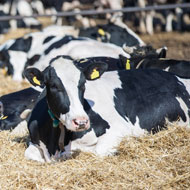Dairy Crest announce milk price cut

The cut will take the quoted UK standard litre of milk to 24.59 pence per litre.
Dairy Crest, the leading british dairy company, has announced that it is cutting payments to farmers by 1.2 pence per litre from 1 February, 2015.
The change will take the quoted UK standard litre of milk to 24.59 pence per litre.
The news comes just two weeks after Arla Foods announced that they will reduce milk prices by 2.03 pence per litre, with effect from 5 January, 2015.
Mike Sheldon, Dairy Crest's group procurement director, commented: “This is hugely disappointing news for all of our supplying farmers. Sadly we have not seen the improvements in dairy markets we had all been hoping for and therefore we have had to reflect this in our February milk price. I sincerely hope that we will start to see signs of recovery during 2015.
“Dairy Crest is working hard to provide a positive long-term outlook for the sector. Not only are we investing £65 million at Davidstow to produce ingredients for the growing global infant formula market, but also, in November, we announced plans to sell our dairies business to Muller Wiseman, subject to competition approval.
“It has been widely accepted that the economies of scale and efficiencies this sale presents, offer the best hope of securing the future of the British dairy sector.”
Commenting on the cuts, Rob Harrison, NFU dairy Board chairman, said: "Although wholesale markets have been giving lower returns to processors over the last few months, some input costs have also been seen to lower and it is vital that processors stand their ground with customers to ensure that reducing farm gate prices are not a result of wayward commercial negotiations.
"It is often all too easy to cut the price to farmers and at the NFU we will be once again contacting those processors further cutting the price to further understand the reasons behind this and ensure that these are transparent, truthful and protect the sustainability of the dairy sector in the short and long-term."



 HMRC has invited feedback to its communications regarding the employment status of locum vets and vet nurses.
HMRC has invited feedback to its communications regarding the employment status of locum vets and vet nurses.